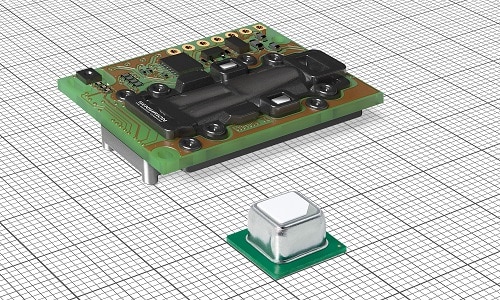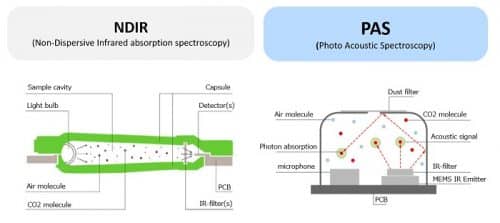Offers high-accuracy sensing and monitoring of CO2, temperature, humidity and other parameters in the surrounding environment

Convenient for places like restaurants and entertainment facilities for monitoring indoor ventilation, temperature and humidity as part of COVID-19 prevention measures, Alps Alpine Co., Ltd. has developed an Ambient Air Sensor Module that performs high-accuracy sensing of CO2 concentrations, temperature and humidity in the nearby surroundings. Other sensors can be included, too, for detection of PM2.5, volatile organic compounds (VOCs) and alcohol.
Despite progress made in the development of vaccines, it will take time for the COVID-19 pandemic to end. Therefore, prevention is the best option to stop its spread. Generally, clusters of infections emerge in closed spaces with poor ventilation that are crowded with many people who engage in conversation or speech within arm’s reach. Various strategies have been introduced to prevent infections. For example, businesses operating spaces where people gather in close quarters, such as restaurants and entertainment facilities, have limited entry, shortened hours, implemented hand sanitising and temperature taking, and ensured ventilation.
However, constant ventilation with windows or doors being open the whole time can affect the indoor temperature and humidity, making it difficult to maintain a pleasant environment. The other option is routine ventilation, with priority placed on the regulation of temperature and humidity. But the problem here is that it is hard to tell whether the level of ventilation is actually effective in preventing virus transmission. This has heightened the need for high-accuracy CO2 sensors that can determine optimal ventilation timing. Also, high-accuracy temperature and humidity sensor help restore comfortable conditions after the disruption caused by ventilation.
The sensor module developed by Alps Alpine not only measures changes in CO2, temperature and humidity, but also air pressure, load and electric current. These sensors have been integrated into diverse products, such as automobiles, consumer electronics, smartphones and industrial equipment. Using this expertise, the Ambient Air Sensor Module can contribute to COVID-19 prevention.
Module Details
The module detects ambient CO2 concentrations and temperature and humidity levels with high accuracy, thus preventing COVID-19 transmission while maintaining a comfortable indoor environment.
Specifically examining the CO2 sensor, many existing products employ non-dispersive infrared (NDIR) spectroscopy. The CO2 concentration is determined from the change in the amount of infrared light absorbed by CO2 molecules between an IR emitter and receiver. The large size of sensors is an issue given that detection accuracy corresponds to the distance the infrared light has to travel. Another concern with the NDIR method is the potential for the axis of the emitted infrared light to shift during end-product design or transportation, leading to detection errors.

The CO2 sensor inside the Ambient Air Sensor Module employs photoacoustic spectroscopy (PAS). Here the CO2 concentration is ascertained from the sound of CO2 molecules captured by a microphone as they vibrate in contact with emitted infrared light. Despite the detection accuracy not being dependent on the distance travelled by the infrared light, high accuracy was maintained while realising a compact sensor of 10.1mm × 10.1mm × 6.5mm. And because there is no longer a need to place a detector opposite the IR emitter, as is the case with an NDIR sensor, external impacts have no effects, enabling stable performance.

Specifications
- Detection range: 400 – 5,000 ppm
- Detection accuracy (CO2): ± 40ppm + 5% of reading
- Detection accuracy (temperature and humidity): ±9%RH / ±1.5°C (typ.)
- Supply voltage: 2.4V – 5.5V
- Operating Temperature Range: -10°C to +60°C
- Communication standard: Digital (I2C)
Alps Alpine plans to deploy the module for diverse applications, such as energy-saving functionality in major appliances to help combat global warming and automotive features to stop drivers falling asleep at the wheel, contributing to safe mobility. Mass production is scheduled to begin in fiscal 2022.






